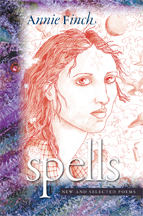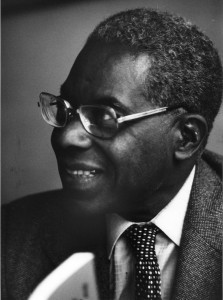Photo of Césaire courtesy of Al. James Arnold
Celebrating Aimé Césaire at 100!
Two new translations of overlooked work give us a fresh reading of this important poet.
This is the centennial year of Martinican poet, playwright, essayist, and politician Aimé Césaire (June 26, 1913–April 17, 2008). Wesleyan University Press is pleased to announce The Original 1939 Notebook of a Return to the Native Land, in English for the first time.
Aimé Césaire cofounded the influential Negritude movement, aiming to restore the cultural identity of black Africans living under colonial rule. Césaire first introduced the concept of Negritude in his work, Notebook of a Return to the Native Land. The concept of Negritude was poorly understood in the United States, where it is usually reduced to the tag line “Black is Beautiful.” Césaire’s concept of negritude is displayed in his verse, in the dynamic structure of the lyric and dramatic that he sometimes referred to as Pelean (named for Martinique’s volcano). Using the word Pelean, he was referring to the violent, explosive imagery that characterized his earlier work, from the late 1930s through the 1950s. This explosiveness is evident in fresh translations of two classic texts in their original editions: Solar Throat Slashed: The Unexpurgated 1948 Edition and The Original 1939 Notebook of a Return to the Native Land.
The period from 1941 to 1948 marked Césaire’s closest association with the Paris surrealists, evident in the collections Miraculous Weapons (1946) and Solar Throat Slashed (1948). His voice was mystifying to American readers, who were used to the style of Langston Hughes and Countee Cullen. Césaire’s treatment of the subject of lynching, for example, elicited no critical response. His poem on the brutal killing of young Emmett Till, “Message sur l’état de l’Union” (State of the Union Address), was published in the Paris journal Présence Africaine (1956) before being collected in Ferrements (Ferraments, 1960). It met the same fate, seemingly falling on deaf ears.
The full flower of Césaire’s heroic vision of negritude is to be found in his lyrical oratorio Et les chiens se taisaient (And the Dogs Were Silent), first published in English in 1990. Similarly, The Original 1939 Notebook of a Return to the Native Land captures the fireworks and passion of Césaire’s earlier work.
During the 1960s, Césaire turned to theatre, discarding the idea of Negritude for black militancy. Both La Tragédie du roi Christophe (The Tragedy of King Christophe), a drama of decolonization in 19th century Haiti, and Une Saison au Congo (A Season in the Congo), the story of the 1960 Congo rebellion, question fate of “black power,” depicting the movement as forever doomed to fail. The condemnation of the United States and the United Nations for complicity in the death of Patrice Lumumba in Une Saison au Congo (A Season in the Congo, 1965) did not elicit much sympathy from either black or white America. Nor did Césaire’s preference for Malcolm X over Dr. Martin Luther King, Jr. Une Tempête (A Tempest, 1969), written in the aftermath of the assassination of Dr. King, improved the playwright’s standing in the eyes of the African-American establishment. The elegiac tone of Césaire’s final collection of verse, Moi, laminaire (I, laminar, 1982), marked a critical engagement with the hero of Negritude.
Césaire was a recipient of the International Nâzim Hikmet Poetry Award, the second winner in its history. He served as Mayor of Fort-de-France, representing the Communist Party. He later quit the party to establish the Martinique Independent Revolution Party. He was deeply involved in the struggle for French West Indian rights and served as the deputy to the French National Assembly. He retired from politics in 1993. In his art, he explored the paradox of black identity under French colonial rule. Césaire died on April 17, 2008, in Martinique.
Praise for The Original 1939 Notebook of a Return to the Native Land
“This book re-presents one of the most significant of all pieces of postcolonial writing in its original version. The scholarship is impeccable; the result of two careers dedicated to Césaire.”
—Martin Munro, author of Shaping and Reshaping the Caribbean: The Work of Aimé Césaire and René Depestre
“A remarkable and essential contribution to the scholarship on Aimé Césaire, unquestionably the most important and influential black poet to have written in French. This is the first time that non-specialists will have access to the original published version of this monument of francophone letters, making it one of the most important publications in francophone studies of recent date. Arnold’s introduction argues compellingly for the singularity and importance of this edition in distinction to the familiar 1956 version.”
—Nick Nesbitt, author of Voicing Memory: History and Subjectivity in French Caribbean Literature
About the book
Aimé Césaire’s masterpiece, Notebook of a Return to the Native Land, is a work of immense cultural significance and beauty. This long poem was the beginning of Césaire’s quest for négritude, and it became an anthem of blacks around the world. Commentary on Césaire’s work has often focused on its Cold War and anticolonialist rhetoric—material that Césaire only added in 1956. The original 1939 version of the poem, here in French and in its first English translation, reveals a work that is both spiritual and cultural in structure, tone, and thrust. This Wesleyan edition includes the original illustrations by Wifredo Lam, and an introduction, notes, and chronology by A. James Arnold.
Read an excerpt here.
Praise for Solar Throat Slashed: The Unexpurgated 1948 Edition
For poets, Solar Throat Slashed may well ignite new poetry and will surely complicate and enlarge our sense of Césaire’s greatness.”
—Adrienne Rich, author of Tonight No Poetry Will Serve
“Not only do Eshleman and Arnold give us excellent translations of Césaire’s at times syntactically knotty, etymologically abstruse, and semantically bedeviling verse; they also contextualize the poems—with an introduction by Arnold and endnotes by Eshleman—with crucial historical information and lucid discussions of the complexities of the poems’ language.”
—Brent Hayes Edwards, author of The Practice of Diaspora: Literature, Translation, and the Rise of Black Internationalism
About the book
Soleil cou coupé (Solar Throat Slashed), Aimé Césaire’s most explosive collection of poetry, is now available in English for the first time. Animistically dense, charged with eroticism and blasphemy, and imbued with an African and Vodun spirituality, this book takes the French surrealist adventure to new heights and depths. The original 1948 French edition of Soleil cou coupé has a dense magico-religious frame of reference. In the late 1950s, Césaire was increasingly politically focused and seeking a wider audience, when he, in effect, gelded the 1948 text—eliminating 31 of the 72 poems, and editing another 29. Until now, only the revised 1961 edition, called Cadastre, has been translated. The revised text lacks the radical originality of Soleil cou coupé. This Wesleyan edition presents all the original poems en face with the new English translations. Includes an introduction by A. James Arnold and notes by Clayton Eshleman.
About the Translators
A. James Arnold is an emeritus professor of French at the University of Virginia. He is the lead editor of Césaire’s complete literary works in French (in progress) and author of Modernism and Negritude: The Poetry and Poetics of Aimé Césaire.
Clayton Eshleman is a professor emeritus at Eastern Michigan University and the foremost American translator of Aimé Césaire. He has published over forty books during his long career, including his own poetry, nonfiction, and translations of such authors as César Vallejo, Pablo Neruda, Antonin Artaud, and others. His honors include a National Book Award in Translation and a Guggenheim Fellowship in Poetry.















